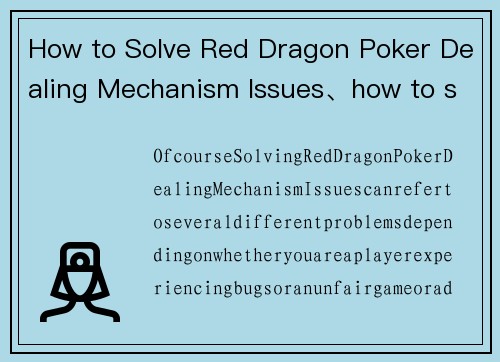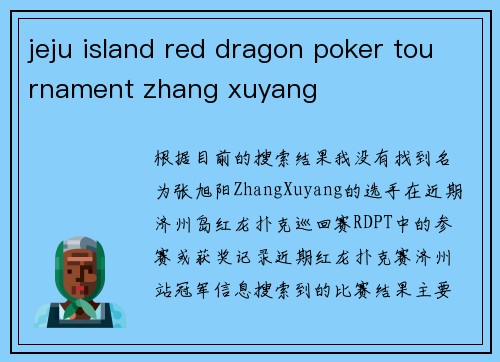集团游戏
How to Solve Red Dragon Poker Dealing Mechanism Issues、how to solve red dragon poker dealing mechanism issues
Of course. Solving "Red Dragon Poker Dealing Mechanism Issues" can refer to several different problems, depending on whether you are a player experiencing bugs or an unfair game, or a developer trying to fix the logic in your code.
This guide will break it down for both scenarios.
Part 1: For Players ( Players (Experiencing Issues in the Game)
If you're playing a game called "Red Dragon Poker" and you feel the dealing isn't random, cards are duplicated, or the game is buggy, here’s how to troubleshoot.
Step 1: Identify the Exact Problem
First, pinpoint what the issue is:
* Non-Random Dealing (Feels Rigged): Are you getting statistically impossible bad hands over a long period?
* Visual/Animation Bugs: Do cards flicker, deal to the wrong spot, or not appear at all?
* Game-Breaking Bugs: Does the game crash during a deal? Do cards get stuck?
Step 2: Basic Troubleshooting
1. Restart the Game: The oldest trick in the book. This clears temporary memory and resets the game state.
2. Restart Your Device: Whether it's a PC or mobile, a full restart can fix underlying system issues.
3. Check Your Internet Connection: For online multiplayer poker, a laggy connection can cause severe desynchronization. It might look like you were dealt no cards or the wrong cards when the server's data isn't updating correctly.
4. Update the Game: Go to the app store (Google Play, Apple App Store, Steam) and check for updates. Developers frequently patch bugs, including dealing mechanism errors.
Step 3: Advanced Checks
1. **Verify File Integrity (on PC
* If you're on Steam, right-click the game in your Library.
* Select Properties > Installed Files > Verify integrity of game files.
* This will check for corrupted or missing game data and replace it.
2. Clear Cache (Mobile & PC):
* Mobile: Go to your device's Settings > Apps > Red Dragon Poker > Storage > Clear Cache. (Do NOT select "Clear Data" unless you are prepared to log in again and potentially lose local progress).
* PC: The location varies. Search online for "Red Dragon Poker cache location [your platform]".
3. Reinstall the Game: This is a nuclear option, but it ensures you have a fresh, clean install. Make sure your account/progress is backed up to the cloud or linked to an account before doing this!
Step 4: Is the Game Actually Fair?
If your main issue is that the dealing "feels" unfair, consider these points about digital poker:
* True Randomness Feels Streaky: A true Random Number Generator (RNG) will create streaks of good and bad luck. Humans are bad at recognizing true randomness and often see patterns where none exist.
* Check for Certification: Legitimate online poker sites use third-party auditors (e.g., eCOGRA, iTech Labs) to certify their RNG is fair and truly random. Check the game's website or settings for a "Certified Fair" or "RNG Certificate" seal. If it's a small, unlicensed app, it might not be properly audited.
* Community Feedback: Search online forums, Reddit, or Discord for the game. Are other players reporting the same issue? If it's a widespread problem, it's likely a bug. If not, it might be variance.
If all else fails, the final step is to contact the game's support team. Provide them with specific details: what happened, when, and screenshots/videos if possible.
Part 2: For Developers (Fixing the Code)
If you are developing a poker game and the "Red Dragon Poker Dealing Mechanism" in your code is broken, here are the most common issues and their solutions.
Let's outline a standard dealing mechanism and where it can go wrong.
Core Components of a Poker Dealing System:
1. The Deck: An array representing 52 unique cards.
2. The Shuffle Algorithm: A function to randomize the deck array.

3. The Deal Logic: A function to remove cards from the top of the deck and assign them to players.
Common Bugs and Their Solutions:
Bug 1: Non-Random Shuffling (Predictable Cards)
* Problem: Using a poor shuffling method, like a naive custom algorithm or a weak RNG seed.
* Bad Example (Home-made shuffle that is biased):
javascript
// This is a common but BAD way to shuffle
deck.sort( => Math.random
* Solution: Use the Fisher-Yates (Knuth) Shuffle. It's efficient and proven to be unbiased.
javascript
// Good Example: Fisher-Yates Shuffle
function shuffleDeck(deck) {
for (let i = deck.length
const j = Math.floor(Math.random * (i + 1));
[deck[i], deck[j]] = [deck[j], deck[i]]; // Swap // Swap elements
return deck;
Bug 2: Dealing Duplicate Cards
* Problem: The deck is not being properly managed as cards are dealt. You are dealing from the array without removing the card, or you are recreating the deck for each new hand instead of resetting it.
* Solution: Model the deck as a stack (Last-In, First
python
# Python Example
import random
class Deck:
def __init__(self):
self.cards = []
self.reset_deck
def reset_deck(self):
# Create a fresh deck of 52 cards
suits = ['Hearts', 'Diamonds', 'Clubs', 'Spades']
ranks = ['2', '3', '4', ... , 'Ace'] # Fill in all ranks
self.cards = [(rank, suit) for suit in suits for rank in ranks]
self.shuffle
def shuffle(self):
random.shuffle(self.cards)
def deal_card(self):
if len(self.cards) == 0:
raise Exception("Deck is empty! Cannot deal a card.")
return self.cards.pop # Take the top card AND remove it from the deck
*Always use `.pop` or a similar method to take a card from the deck array.*
Bug 3: Synchronization Issues (Multiplayer Only)
* Problem: In an online game, if each client runs their own RNG, decks will be out of sync.
* Solution: Server-Authoritative Dealing.
扑克王pokerking官方首页1. The game server maintains the single, canonical deck.
2. The server shuffles the deck using a seeded RNG. (You can even use the seed for replayability/debugging).
3. When a player needs a card, the client sends a request, and the server responds with the specific card from its deck.
4. The client only handles the visual representation of the card the server tells it about.
Bug 4: Game Logic Crash on Deal
* Problem: The code crashes when trying to deal, often due to an empty deck or an index-out-of-bounds error.
* Solution: Implement Defensive Checks.
javascript
dealCardToPlayer(player) {
if (this.deck.length === 0) {
console.error("Attempted to deal from an empty deck!");
this.resetAndShuffleDeck; // Automatically reset if safe
// Alternatively, throw a controlled error
const newCard = this.deck.pop;
player.hand.push(newCard);
return newCard;
Summary
* For Players: Focus on technical troubleshooting (restart, update, reinstall) and investigate the game's legitimacy.
* For Developers: Rigorously implement a Fisher-Yates shuffle, manage your deck as a stack using `pop`, and for multiplayer, ensure all dealing logic is server-authoritative.
By following these steps, you should be able to diagnose and resolve most issues related to a Red Dragon Poker dealing mechanism.
2025-10-22 17:35:37
